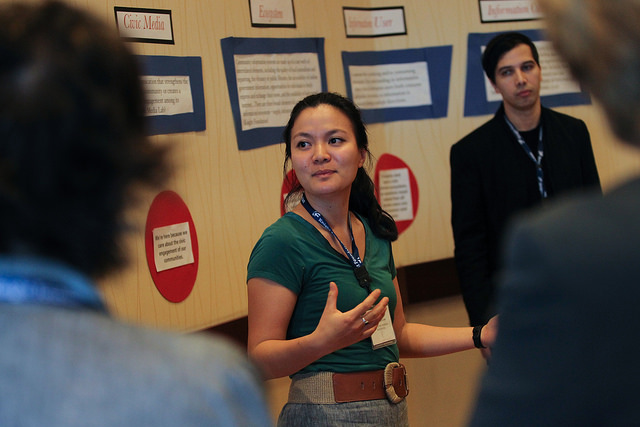
Strengthening communities: The case for talent, opportunity and place
Photo credit: Knight Foundation on Flickr.
The way we live today, surrounded by so much information and misinformation, presents a critical challenge: How do you make good decisions about how to best serve a community?
Finding the answers can be difficult for many community and place-based foundations.

RELATED LINKS
“4 new community information investments focus on high-impact projects” by Marika Lynch on KnightBlog.org
“2014 tech trends that will impact foundations” by Elise Hu on KnightBlog.org
“Going for Goal: Shared knowledge inspires successful Giving Days” by Bahia Ramos on KnightBlog.org
“How to open up the data in your community to help solve problems” by Elise Hu on KnightBlog.org
“Embracing change: Five key lessons from innovative community foundations” by Elise Hu on KnightBlog.org
“How to apply human-centered design at home: Lessons from the Media Learning Seminar” by Elise Hu on KnightBlog.org
“Using design thinking for community information needs” by Marika Lynch on KnightBlog.org
“Join us – virtually – for a conversatino on community news and information” by Marika Lynch on KnightBlog.org
For funders, the choice is “always a good cause versus a good cause,” said Carol Coletta, Knight Foundation’s vice president for Community and National Initiatives, as she opened the foundation’s Media Learning Seminar. “You choose on the basis of what the research tells you…Getting the information right, and getting the right information to the right people are the first steps in making any community successful.”
That’s what makes the seminar, a gathering of philanthropy, media and tech leaders centered on community information needs, so important, she said.
Coletta opened the seminar with a look at Knight’s framework for investment decisions in its communities, a strategy that focuses on talent, opportunity and place.
1) Talent
Talent in a community is a predictor of economic success, but talented people are mobile, and younger talent is even more mobile. “If a city doesn’t have a talent strategy, it doesn’t have an economic development strategy,” Coletta said. “Harness it.” Knight Foundation is choosing investments based on finding, attracting and retaining talented people, and helping them get connected or reconnected to their communities.
2) Opportunity
As policymakers grapple with rising economic inequality in the country, so are grantmakers. “If where you are born is where you will end up … we will lose our mojo if you can’t transcend your ZIP code,” Coletta said. Research backs up this notion: Harvard’s Raj Chetty found that places where low-income people lived separately from middle-income people showed low rates of upward mobility. “Can we find a way into that issue where we feel like we can help make a difference?”
3) Place
Place focuses the work of most community foundations, and it’s the third leg of the Knight Foundation’s platform for community investing. “So many young people choose the place they want to live in first, then they look for a job there,” Coletta said. Place accelerates both talent and opportunity.
“It all starts with informed and engaged communities. You don’t get more talent, more opportunity and places that accelerate both without information and engagement. That’s why the work you do and share here at the [Media Learning Seminar] is so important to the success of communities.”
Read more about Knight’s commitment to building successful communities with an earlier post from Coletta.
Elise Hu is a journalist at NPR and a consultant for Knight Foundation.
More information on talent, opportunity and place:
A Pew Research Center report contains additional information about the rising value of college degrees. Further research on talent mobility can be found via CEOs for Cities.
Watch live streaming video from knightfoundation at livestream.com
Recent Content
-
Communitiesarticle ·
-
Communitiesarticle ·
-
Communitiesarticle ·


